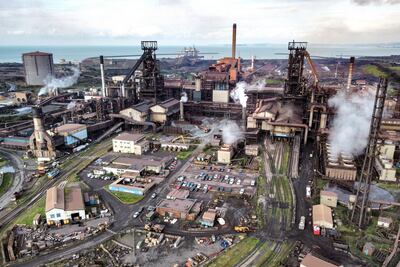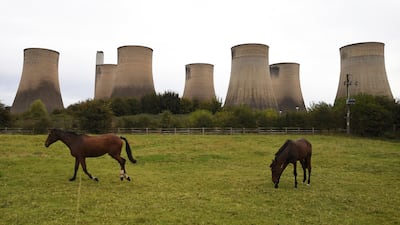Britain will become the first country in the G7 to scrap coal-fired power production on Monday, in a move that coincides with the closure of the last blast furnace at one of the world’s biggest steelworks in south Wales.
Uniper's coal plant at Ratcliffe-on-Soar, in central England, ceased operating, ending 140 years of coal-generated electricity production in Britain, as blast furnace four at Tata Steel UK's Port Talbot plant also shuts, with the loss of almost 2,000 jobs. Blast furnaces use coke, a carbon-intensive fuel made from coal to produce steel.
In 2015, Britain announced plans to close its coal plants within the next decade as part of wider measures to reach its climate targets. At that time, almost 30 per cent of the country’s electricity came from coal but this had fallen to just over 1 per cent last year.
Britain, which has a target to reach net-zero emissions by 2050, also plans to decarbonise the electricity sector by 2030, a move that will require a rapid acceleration in the use of renewable power such as wind and solar.
“The era of coal might be ending, but a new age of good energy jobs for our country is just beginning,” Energy Minister Michael Shanks said.
Dr Frederick Harry Pitts, senior lecturer in politics at the University of Exeter, said the decision to scrap coal production and close blast furnace four is “a gamble on the future resting with renewables”.
“The gamble here is it is a sure enough bet to be able to get the foundations of a net zero transition in place before the rubber hits the road and it becomes necessary to have that at our disposal,” he told The National.
“But the thing is, there are all sorts of tensions in that the Labour government are going to have to be navigating politically and economically.”
That includes “the need to navigate” twin challenges of a more dangerous world geopolitically and the climate crisis.

“Labour came to power talking about securonomics, as Rachel Reeves puts it, or the idea of building an economy that is a little bit more interested in national security as part of economic policy. And having sovereign strengths in some of these areas. This is a day that in a way symbolises the difficulties of achieving some of that, perhaps” said Dr Pitts.
There is “the need for an industrial strategy, which Labour are going to announce in the coming weeks. But also the difficulties of balancing the need for Britain to build its industrial base back up again, while also committing itself to the net zero transition. And it won’t be a smooth process, by any means.”
Emissions from energy make up about three quarters of total greenhouse gas emissions, and scientists have said the use of fossil fuels must be reduced to meet goals set by the Paris climate agreement. In April, the major industrialised G7 countries agreed to scrap coal power in the first half of the next decade, but also gave some leeway to economies that are heavily reliant on the fuel, drawing criticism from environmental groups.
“There is a lot of work to do to ensure that both the 2035 target is met and brought forward to 2030, particularly in Japan, the US and Germany,” said Christine Shearer, research analyst at Global Energy Monitor. Coal power still generates more than 25 per cent of Germany's electricity and more than 30 per cent of Japan’s power.
Jennifer Layke, global director of the energy at the World Resources Institute, said the UK was “leading the way with impressive speed in phasing out coal power generation”.
“Policies such as carbon pricing and renewable auctions helped bring scale to the renewable energy economy. Industrial coal use remains, but the country also set records last year with electrification by heat pumps in both industrial and home use, cutting the need for coal and fossil gas in heating,” she said.
Green energy sources - in pictures
“To continue progress, the government must now turn its sights to policies and timetables that transition British industry away from oil and fossil gas.
“Acting on recent discussions of increasing windfall taxation and reducing subsidies could accelerate investments in clean alternatives. Bringing affordable, reliable clean energy to all people is a goal all governments should deliver.”
The Port Talbot plant will be replaced by a £1.25 billion ($1.68 billion) electric-arc furnace, which in 2027 will start using electric current to melt scrap metals and produce steel. It is estimated moving to electric-arc steel production will reduce the UK's overall CO2 emissions by about 1.5 per cent.
In its heyday during the 1960s, the site employed more than 18,000 people but it has since gone through many periods of change, which have included strikes and job cuts.
Indian conglomerate Tata, which bought the Welsh steelworks in 2007, will be releasing 155 hectares of the Port Talbot site for industrial redevelopment. About 500 jobs are expected to be created during the construction of the electric-arc furnace.
Community union general secretary Roy Rickhuss said the closure marked an “incredibly sad and poignant day” for the British steel industry. “The skills and retention scheme we negotiated with Tata is going to be vital,” he said.
“The scheme gives workers up to an additional year of employment to gain new skills to find new employment, and importantly participants will be prioritised where there are vacancies in the company. The closure of blast furnace four marks the end of an era, but this is not the end for Port Talbot. We will never stop fighting for our steel industry and our communities in South Wales.”







